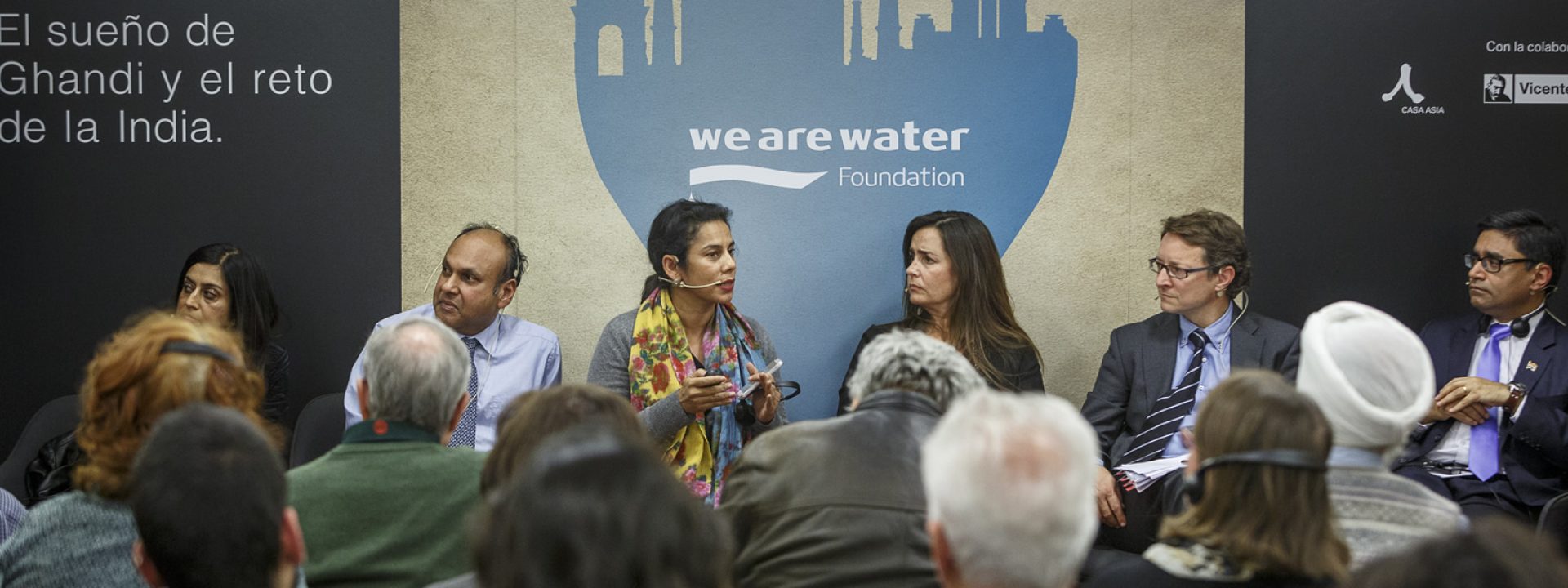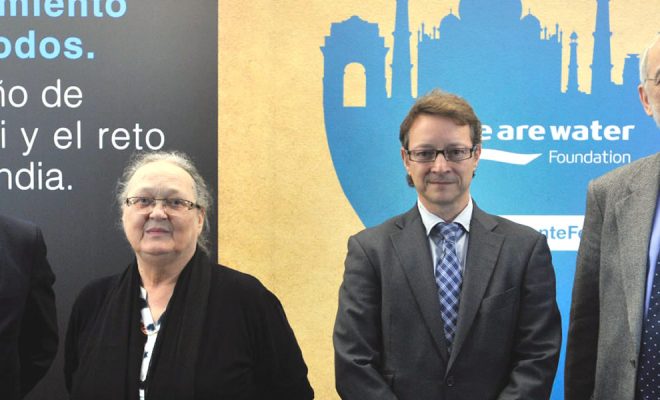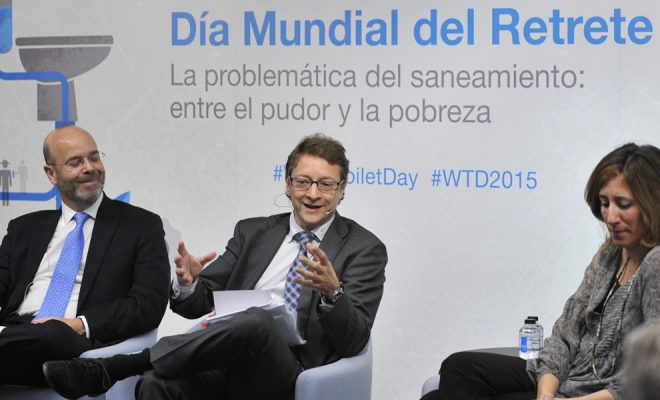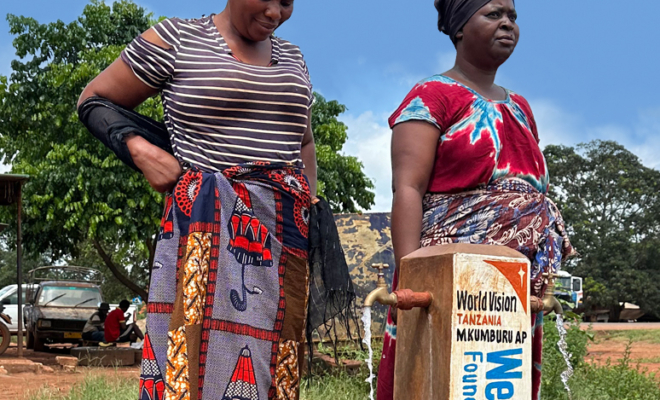For World Toilet Day, the We Are Water Foundation organised “Sanitation for all. Ghandi’s dream and the challenge of India”, a debate in which the goals of the SWACHH Bharat programme were set out.
The Asian giant shows the planetary scale of the problem of sanitation.
The installation of toilets must be accompanied by community participation, justice and, above all, education.
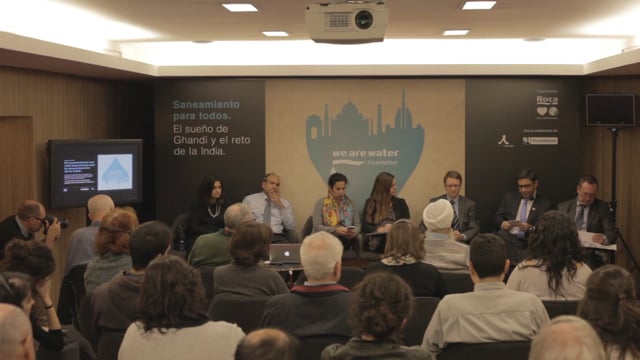
India is a country of colossal human dimensions. It is the second most populated country in the world, with more than 1.2 billion people, of which 377 million live in cities. It has a surface area of 3,287,595 km2 with jungles, deserts, glaciers and massive urban conglomerations, with climatology of major contrasts and which is also one of the countries most threatened by climate change. It is a country with a human and economic geography of great inequalities and a fascinating melting pot of cultures.
Consequently, problems also appear on a larger scale, and the most significant of them is that of sanitation: more than eight million homes do not have toilet installations. This is the reason behind why it is the country with the highest number of people who defecate in the open air: around 600 million people in 2014.
The Indian government proposes to end this indignity which has a high hygienic and economic cost. It is the SWACHH Bharat programme: to end defecation in the open air by 2019. The year coincides with the 150th anniversary of the birth of the country’s father of independence, Mahatma Gandhi, from who comes one of the most famous sayings in the world of water “Sanitation is more important than independence”.
India is therefore one of the major references when we speak of sanitation. This is what the We Are Water Foundation wanted to reflect on for World Toilet Day held on the 19 November in the Roca Barcelona Gallery at the round table discussion “Sanitation for all. Ghandi’s dream and challenge of India”, a title that reflects the spirit of the SWACHH Bharat programme, which was the main reference of the debate.
The event was attended by eminent guests and experts very close to the situation in the massive Asian country: Vikram Misri, the Indian ambassador in Spain; Gour Saraff, managing director of the European Chamber of Commerce of India; María Vallés, Director of Corporate Development in the Vicente Ferrer Foundation; Anupama Kundoo, architect and lecturer at the Camilo José Cela University in Madrid; Bharati Chaturvedi, writer, environmental specialist and director of the Chintan Environmental Research and Action Group; and Xavier Torras, director of the We Are Water Foundation. The debate featured Ramón María Moreno, managing director of Casa Asia, as presenter and chairperson.
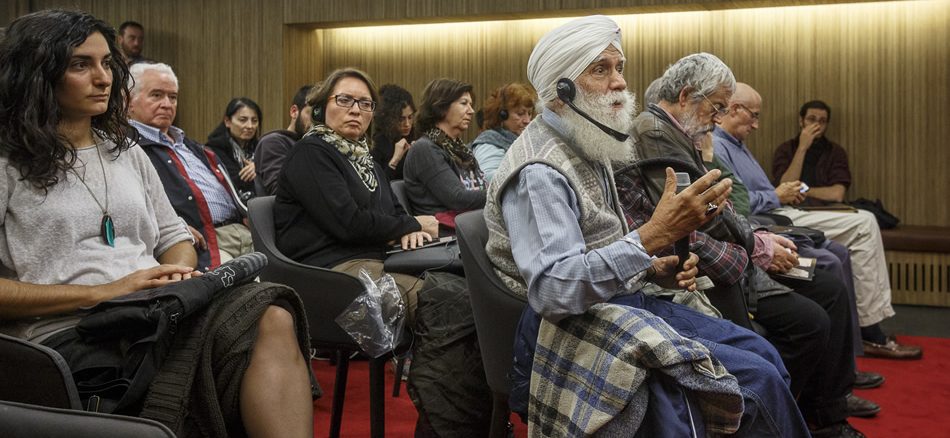
Beyond the latrine: security and education… and clean water
The magnitude of the challenge of the SWACHH Bharat programme was made very clear in the intervention by Vikram Misri. How do we deal with a problem that affects both the urban centres and rural areas and is directly related to the need for infrastructures? For Misri we must “increase the capacity of the local institutions and also count on private initiatives through the programmes of corporate responsibility of companies” since the cost of the programme is estimated at 10 billion dollars to install the 120 million toilets planned. This effort is already under way and between April 2014 and January 2015, 3.1 million toilets had been built.
Logically, however, the mere installation of toilets does not solve the problem, and we should understand that the toilet is the beginning of a cycle of circulation of faecal waste that needs drains, non-polluting security, and treatment of waste water. There is also a fundamental aspect in which lies the attainment of sustainability of the actions taken: education. “Without education, we cannot guarantee either the appropriate use of the installations or their maintenance. It is essential to establish educational programmes in the more than 4,000 municipalities in the country”, stated Misri.
The Indian ambassador ended by highlighting the importance for his country in achieving the goals of the programme that aim to improve people’s health and reduce the extremely high environmental cost of the problem. The involvement of the Prime Minister of India in the project is, for Misri, a reliable demonstration of how important it is.
Xavier Torras, director of the We Are Water Foundation seconded the words of Vikram Misri and placed the problem of India as paradigmatic in the context of the world goals for sanitation: “In India there is a veritable administrative and organisational challenge, since it is a massive country and is an example on a world scale. The problem of sanitation affects 2.5 billion people in the world. In the Millennium Goals an improvement in the supply of water has been achieved, since in 2005 we were above the 1 billion people without a suitable water supply and now the figure is around 700 million. In the case of sanitation it has not been thus: there are now 2.5 billion people without suitable sanitation out of the more than 7 billion of us who live on the planet, and this is a serious problem”.
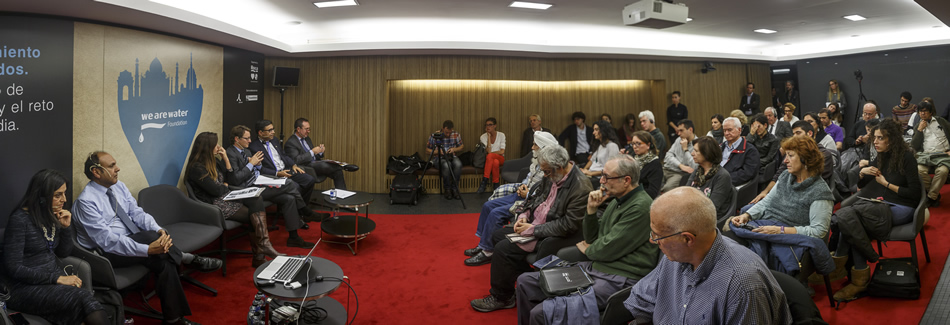
Without participation, quality and education, the latrines are of little use
The social aspect of the challenge of providing dignified sanitation is clear in the work of the Vicente Ferrer Foundation in Anantapur. María Vallés made it crystal clear what the conditions are so that the installation of toilets fulfil their goals and she supported her arguments with the experience of the massive task undertaken by the Foundation that has always had ecology and housing as pillars of its work: “The participation of the community and the quality of the installations are absolutely essential. Without quality there is no sustainability, since the latrines are no longer used, and participation is the basis so that education, also essential, achieves changes in behaviour towards the suitable use of the toilets which is very unequal between genders and ages”.
Vallés underlined the collaborative work with the We Are Water Foundation in the projects in India with the Vicente Ferrer Foundation and specifically mentioned the participation in the SWACHH Bharat programme: “We will build 100,000 latrines, of which the We Are Water Foundation will provide us with 40,000. At present 18,700 have reached us and we have already installed 200”.
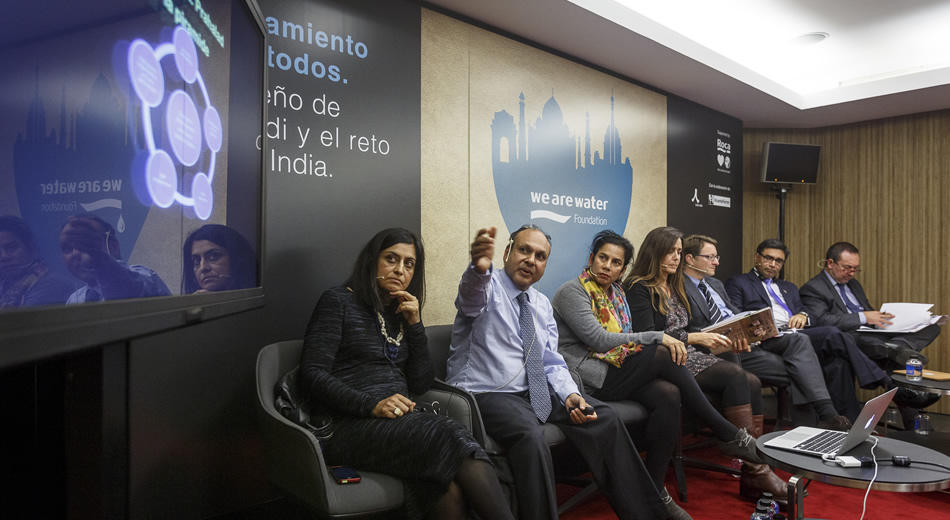
The latrine of the future requires innovation
María Vallés insisted on the importance of research in the search for new toilet materials and systems that can produce energy and fertilisers, and which do not require water. The architect Anupama Kundoo made a serious contribution to the subject. As an expert in new materials and systems of integration of energy efficiency solutions and the use of water, the Indian specialist summed up some fundamental aspects of the technological challenge in the design of new toilets: “In India we have the chance to reinvent toilets, introducing new concepts such as the attainment of biogas and fertilisers without having to rely on traditional toilets with water flow. We must also rethink the materials, finding solutions that are easy in order to improve toilets and obtain them with much-reduced resources”.
Innovation must also extend to economic aspects. Is it possible to turn the deployment of latrines into a source of income for the community? For Gour Saraff there must be several solutions to the problems of sanitation in India and we must ask the basic questions such as who is going to be responsible and who is going to maintain the installations?
For the managing director of the European Chamber of Commerce of India there are solutions inspired by the approaches of the economist C.K. Prahalad, founder of the concept of “the fortune in the base of the pyramid”, who suggests that, despite it being a still unexplored market, the potential of consumption of the poorest sector of the world’s population will be key in the development of business strategies in the future.
Saraff explained that in India many actors must be mobilised: NGOs, local institutions and associations, but also private companies that can obtain profitability: “In India there is a complex social and political structure. We must involve everyone in order to have a possibility of success, and creating business might be a good strategy”. He gave an example of applying Prahalad’s theory in Kenya, where the installation of latrines has led to a waste collection business to produce biological fertilisers. “If this is done in an area where there are organic crops, farmers will be interested in this type of fertiliser and the activity may be profitable for everyone; for the users of the latrines, the transport company and the treatment plant”.
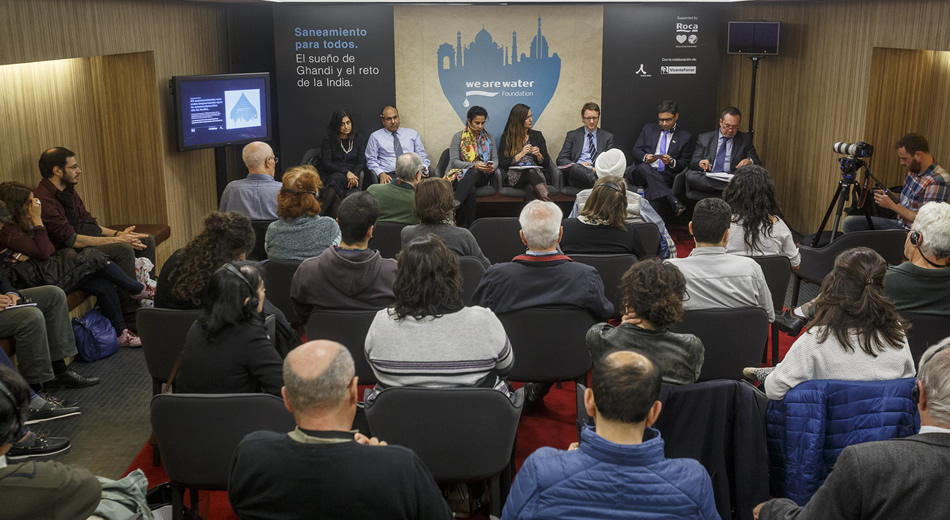
Technology yes, but cheap and decentralised
In India all the figures are dizzying, including those regarding waste. The whole county produces more than 70 million tons of waste every year. In a growing economy that attracts companies, increasing consumption and an explosion in growth, the perspectives of waste generation become alarming.
Bharati Chaturvedi spoke of this environmental problem and its social perspective, pointing out that the solutions involve taking into account the concept of ecological justice: “We must develop human capital to create justice that goes beyond cleaning the environment. The poor always live in the worst places and have water in the worst conditions. They are also the most vulnerable to storms and flooding”.
Chaturvedi then covered the problem of waste treatment. In India, two million people make a living from the enormous amount of waste which they collect manually. These people work informally, like 92% of employees in the country. Their work, however, carries out an important preventive function: it avoids a large part of this waste ending up in rivers and contaminating the subsoil. How, then, can this work be made fair and improve both the lives of those that do it and the cleanliness of the environment? For the founder of the Chintan Environmental Research and Action Group the solution lies in working with a strong community involvement and for the adoption of suitable technologies: “We need human capital to recycle, people who work at a neighbourhood level and in the community, and these people must use technologies within their reach. We agree in that the technology is not the solution, but we need it; the condition is that it is not expensive and that it is decentralised. This is a major challenge, above all in light of climate change”.
The debate demonstrated the seriousness of the problem, but also the enormous effort being made with solutions such as the SWACHH Bharat programme as they are founded and developed. Community participation and education are the basis for any successful innovative action in any social problem, and sanitation is a paradigmatic example. The quote of Gandhi that Gour Saraff recalled sums up a philosophy that we should all take into account: “Be the change you wish to see in the world“. Each one of us must be involved.
ABOUT THE WE ARE WATER FOUNDATION
The We Are Water Foundation, promoted by the Roca company, has as objectives, on the one hand, to raise awareness amongst the general public and the administrations about the need to promote a new culture of water and, on the other hand, relieve the negative effects related to the lack of hydric resources, through the development of cooperation and aid programmes alongside diverse organisations such as Education without Frontiers, the Vicente Ferrer Foundation, Intermón Oxfam and UNICEF.


